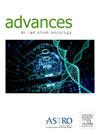Perceptions, Uses, and Information Sources of Medical Cannabis Among Patients With Cancer
IF 2.2
Q3 ONCOLOGY
引用次数: 0
Abstract
Purpose
Although medical cannabis (MC) has been shown to relieve cancer- and treatment-related symptoms, there is increasing misinformation regarding its antitumor efficacy. We aimed to identify opportunities for oncologists to communicate evidence-based guidance to patients regarding its use.
Methods and Materials
Patients with cancer seen in radiation oncology clinic between June 2022 and July 2023 were surveyed with a questionnaire regarding their perceptions and information sources of MC. Associations between survey responses and demographic and disease variables were evaluated. Qualitative thematic analysis was performed on narrative responses in search of common themes.
Results
Eighty-four patients (84% completion rate) were included in the analysis. Most (83.3%) strongly agreed or agreed that MC can provide symptom relief, whereas a subset of patients (15.5%) strongly agreed or agreed that MC can cure cancer. This latter subcohort was significantly more likely to identify as Hispanic/Latino (38.5% vs 9.9%, P = .009) and less likely to be up to date on COVID-19 vaccinations (30.8% vs 8.5%, P = 0.044). Identifying as Hispanic/Latino remained significantly associated with strongly agreeing or agreeing that MC can cure cancer on bivariate analysis (odds ratio, 6.528; 95% CI, 1.477-28.715; P = .012). Education level, other sociodemographic characteristics, and sources for information about MC were not significantly different between these patients. Thematic analysis revealed that patients hoped to learn more about MC from their oncologists but perceived them to be unknowledgeable on the subject.
Conclusions
Although most patients consider MC to be a valuable addition to conventional therapies for managing refractory symptoms, a subset believed it had potential as an anticancer therapy. Many patients rely on unregulated sources, highlighting the need for providers to address misinformation, bridge knowledge gaps, and clarify its use.
癌症患者对医用大麻的认知、使用和信息来源
目的:虽然医用大麻(MC)已被证明可以缓解癌症和治疗相关症状,但关于其抗肿瘤功效的错误信息越来越多。我们的目的是为肿瘤学家提供机会,向患者传达关于其使用的循证指导。方法和材料对2022年6月至2023年7月期间在放射肿瘤学诊所就诊的癌症患者进行问卷调查,了解他们对MC的看法和信息来源,并评估调查结果与人口统计学和疾病变量之间的关系。对叙事反应进行定性主题分析,寻找共同主题。结果84例患者(完成率84%)纳入分析。大多数患者(83.3%)强烈同意或同意MC可以缓解症状,而一小部分患者(15.5%)强烈同意或同意MC可以治愈癌症。后一个亚队列更有可能被识别为西班牙裔/拉丁裔(38.5%对9.9%,P = 0.009),更不可能及时接种COVID-19疫苗(30.8%对8.5%,P = 0.044)。在双变量分析中,识别为西班牙裔/拉丁裔与强烈同意或同意MC可以治愈癌症仍然显着相关(优势比,6.528;95% ci, 1.477-28.715;P = .012)。这些患者的教育水平、其他社会人口学特征和MC的信息来源没有显著差异。专题分析显示,患者希望从他们的肿瘤医生那里了解更多关于MC的知识,但认为他们对这一主题知之甚少。结论:尽管大多数患者认为MC是治疗难治性症状的一种有价值的常规疗法的补充,但一部分患者认为它具有抗癌治疗的潜力。许多患者依赖于不受监管的来源,这突出了提供者解决错误信息、弥合知识差距和澄清其用途的必要性。
本文章由计算机程序翻译,如有差异,请以英文原文为准。
求助全文
约1分钟内获得全文
求助全文
来源期刊

Advances in Radiation Oncology
Medicine-Radiology, Nuclear Medicine and Imaging
CiteScore
4.60
自引率
4.30%
发文量
208
审稿时长
98 days
期刊介绍:
The purpose of Advances is to provide information for clinicians who use radiation therapy by publishing: Clinical trial reports and reanalyses. Basic science original reports. Manuscripts examining health services research, comparative and cost effectiveness research, and systematic reviews. Case reports documenting unusual problems and solutions. High quality multi and single institutional series, as well as other novel retrospective hypothesis generating series. Timely critical reviews on important topics in radiation oncology, such as side effects. Articles reporting the natural history of disease and patterns of failure, particularly as they relate to treatment volume delineation. Articles on safety and quality in radiation therapy. Essays on clinical experience. Articles on practice transformation in radiation oncology, in particular: Aspects of health policy that may impact the future practice of radiation oncology. How information technology, such as data analytics and systems innovations, will change radiation oncology practice. Articles on imaging as they relate to radiation therapy treatment.
 求助内容:
求助内容: 应助结果提醒方式:
应助结果提醒方式:


